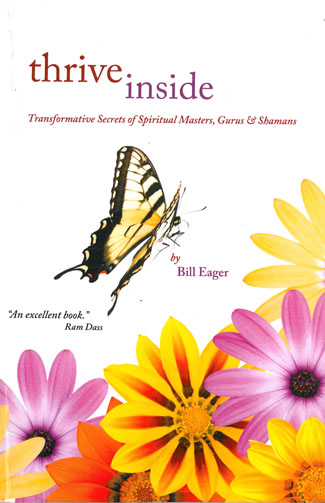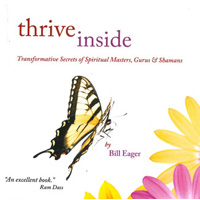Stress – Understand and Eliminate this Silent Killer
Author by Bill Eager

An excerpt from the new book Thrive Inside: Secrets of Spiritual Masters, Gurus and Shamans which is available on Amazon.com.
This section of this book is devoted to the reader who would like to understand the scientific underpinnings that support a holistic approach to good health.
When I understand science to the point that I “get it,” then I can let go of doubts and engage in the experience. I am getting better at accepting the fact that the proof of alternative therapies is actually in the pudding, and not in the theory. Let’s find what works and use it. When I teach workshops, many people have a desire to understand mentally what occurs energetically.
Every yogic and shamanic technique has been perfected over thousands of years. The smallest detail in the sound of an ancient mantra; invocations in a sweat lodge or the physical gesture of a hand mudra creates a definitive impact that modern science can measure. This explanation is not necessary for great masters, like my guru Yogi Amrit Desai, because they learn techniques from trusted sources. For the rest of us, science is our bellwether.
It is only because modern science and medicine have put a question mark on processes that do not have an FDA Stamp of Approval that we desire the “science” behind the profound medicinal techniques of the ancients. Any process that has been handed down for fifty generations has had more clinical trials than any modern drug that we readily pop in our mouth without questioning potential side effects. Listen to any television ad for a drug. It is amazing how long the list of disclaimers runs. You know it: “Call your doctor if….. In rare cases… Side effects may include vomiting, bleeding, headaches.“ Here is what happens to your physical body when real or perceived stress occurs:
-
Blood pressure increases and breathing quickens to prepare your muscles for action.
-
Blood is pulled away from the stomach and skin and moves to major muscle groups.
-
As adrenaline is released, your heart rate goes up.
-
Digestive problems may occur. Upset stomach and diarrhea are common.
-
Fat is metabolized to create instant energy.
-
Your palms and skin may become clammy and sweaty. Perspiration prevents your body from overheating.
-
Blood vessels in your skin constrict. This reduces possibility of blood loss in case of serous injury.
-
Your pupils dilate.
-
Endorphins, your body’s natural pain killers, are released to soften any pain.
A lot happens quickly, and silently. The degree to which all of these physiological reactions occur depends on the nature and the length of the stress. What you want to do is understand and consciously decouple the fight or flight response.
Stress hormones act on an area of the brain called the Limbic System. Where is this?
 Let’s take a look at our brain. Slice it in half vertically between the right and left hemispheres. The top portion of the brain, the second story, contains the cortex. Downstairs we find the limbic brain. Our limbic brain evolved 300 million years ago. It is the seat of emotions. It maintains blood pressure, heart rate, body temperature and blood sugar levels. The limbic brain is critical to our ability to learn. It is necessary for short-term and long-term memory. It stores the vast memories of our life experiences. The functions of the limbic brain include our desire to fight, flee, feed and have sex.
Let’s take a look at our brain. Slice it in half vertically between the right and left hemispheres. The top portion of the brain, the second story, contains the cortex. Downstairs we find the limbic brain. Our limbic brain evolved 300 million years ago. It is the seat of emotions. It maintains blood pressure, heart rate, body temperature and blood sugar levels. The limbic brain is critical to our ability to learn. It is necessary for short-term and long-term memory. It stores the vast memories of our life experiences. The functions of the limbic brain include our desire to fight, flee, feed and have sex.
Emotional symptoms like anxiety, mood swings and depression are due to the effects of stress hormones on the limbic system. Stress hormones act on the frontal lobe which is related to short term memory resulting in memory disturbances. Hippocampus which is also situated in the temporal lobe (part of the limbic system) and concerned with long term memory gets influenced by the stress hormones which usually results in storage of the bad experience due to stress, which the person may recall repeatedly in the future.
The hippocampus is, in fact, continually stimulated by events that are traumatic or dramatic. This includes television programs, movies and video games that contain violence. This stimulation creates addiction. In addition to this external stimulation we create stories in our psyche. These stories become self-fulfilling prophecies. Why? Because the universe mirrors back to us the condition of our brain.
As a result of external and internal experiences we reinforce the neural networks in the limbic brain. It becomes difficult to heal from a traumatic memory that is instilled and installed in our hippocampus. Think post traumatic stress syndrome.
The brain desperately needs to be rewired. We want to break free of the programming of the limbic brain. We need to break free from the addictions to the stories. For some people it can be harder to stop watching television than it is to stop the mind chatter. For others the opposite is true. This is not a mandate to never buy another ticket to a James Bond movie. The point is to be conscious of the fact that external and internal dramas can create physiological results not conducive to a healthy mind, body and spirit. Fear of not having enough – of anything – is a common external and internal drama. Hand in hand with this is the fear of losing what you already have. We all need to know in our deepest heart that we can live in abundance REGARDLESS of what we have. We need to get away from a paradigm of fear, aggression and scarcity.
A Stressful Chain Reaction
Our cardiovascular system takes a hit. Adrenaline acts on the B1 receptors of the heart (B1 receptors are chemical substances present on the wall of the heart which readily combines with adrenaline and related hormones which results in stimulation of the heart) resulting in increase in rate and force of contraction. The result is increased cardiac output. The hormone also acts on the alpha receptors of the blood vessels( alpha receptors are chemicals found in the walls of the blood vessels which readily combine with adrenaline and related substances which results in stimulation of the blood vessels) resulting in their contraction. The result is increased blood pressure.
The immune system takes a hit. The hormone cortisol, which is a steroid, is an immunosuppressant. Increased levels of the hormone suppress the immune system resulting in increased susceptibility to infections. Over time, steroids derange the entire immune system. Cortisol, if secreted continuously due to persistent stress, creates imbalances – even including allergic disorders.
Stress and anxiety also trigger the production of dopamine and norepinephrine. These are our body’s natural amphetamines. They suppress serotonin activity, which is one of our body’s natural mood stabilizers. This neurotransmitter activity creates emotional ups and downs. Dopamine activity is extremely addictive. That is why methamphetamine (meth) is incredibly addictive. Meth releases twelve times as much dopamine in the body as what normally occurs when we engage in pleasurable activities like eating food and having sex. When addicts use meth over and over again, the drug changes their brain chemistry. It destroys the wiring in the brain’s pleasure centers and ultimately makes it impossible to experience any pleasure at all.
We don’t have lions chasing us down Main Street, through or kitchen, or the corridors of our office building. Yet we do this all day long. The smallest remark by a colleague or a relative starts this chain reaction. Not to mention long lines in stores, driving conditions and too many projects on our plates. How do we cope with this stress? Usually by drinking an energy drink, coffee or tea. In reality these are anti-energy drinks that bring sugar and caffeine into our system. Not only do sugar and caffeine make us tired; they also make us more susceptible to overreacting to the next event. The bottom line is there is both a physiological and a psychological aspect to the underlying cause of many common and serious diseases.
Physiological – the many results of adrenaline and cortisol rushes.
Psychologoical – our own mind buying into artificially created fight or flight situations.
About the Author
Bill Eager has written 10 books. He is a certified Amrit Method yoga instructor, yoga nidra facilitator, Reiki and energy healer who teaches workshops across the country. His book Thrive Inside is available at Amazon.com and www.ThriveInside.net.



























